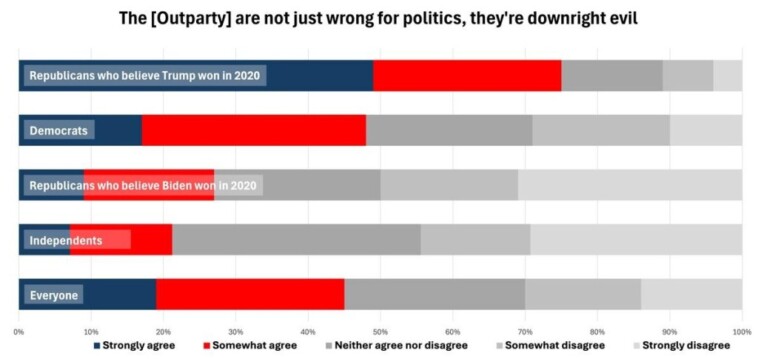Nearly half of eligible voters in the US believe that those in the opposing political party are “downright evil,” according to a new poll conducted by Johns Hopkins University.
The country’s divisiveness was clearly illustrated by the survey, which was conducted twice, first from July 26 to July 30 — mere weeks after the first assassination attempt on former President Donald Trump — and the second from Sept. 6 to Sept. 18 by the university’s SNF Agora Institute.
Roughly 2,000 respondents were split up into five categories for the poll — Republicans who believe Donald Trump won the 2020 election, Republicans who believe that Joe Biden won the 2020 election, Democrats, Independents, and then everyone altogether.
Of the Republicans who believe that Trump won in 2020, three-quarters think that Democrats are evil.
On the other end, half of Democrats considered Republicans evil, according to the survey results.
The poll creators said those divisive beliefs are dangerous for the country’s democracy.
“Vilifying our political opponents is a signal that we consider them to be enemies instead of opponents,” said Lilliana Mason, a Johns Hopkins University political science professor who studies political violence and polarization.
“The work of governing a democracy requires compromise and mutual respect. These sentiments make that respect nearly impossible, which threatens the health of democracy.”
Respondents for the poll answered questions about their party affiliations, political identities, the 2020 election results, where they get their information, and what they think about people from other parties. The published findings are based on the responses of 2,000 respondents who create a demographically and politically representative sample of the US electorate, the pollsters said.
Mason and Scott Warren, two SNF Agora fellows, co-led the project and created the poll in an attempt to determine where exactly the country’s voting body is at leading up to the 2024 presidential election, the Johns Hopkins University Hub reported.
The information gathered from the two surveys indicates a stark, and increasing, divide between Republicans known as “election deniers” and the rest of the voting body, especially when concerning issues based on gender and race, the researchers said.
“2020 election denialism has become an identity issue as much as a substantive policy measure,” Warren said.
“Republicans who do believe in the results of the 2020 election have strikingly pro-democracy viewpoints and may feel that they don’t have a political home at this moment in time. Figuring out how to include them in our democracy is critical at this moment.”
The data suggests that Republican election deniers are less likely to think a woman should be president, with 28% believing women are meant to take care of a home rather than work a job.
More than 80% of election deniers also strongly or somewhat agreed that black Americans should push past prejudices “without special favors” like the “Irish, Italian, and Jewish ethnicities” did throughout the 20th century.
Election deniers and Republicans who believe Biden won in 2020 polled that they were most motivated to vote by the state of the economy, immigration, and crime. Meanwhile, Democrats said that they prioritized abortion, the economy, and democracy, according to the poll.
Independents had a combination — listing the economy, immigration, and abortion as the top issues impacting their vote.
A third round of polling is set to take place prior to the November general election next week.






